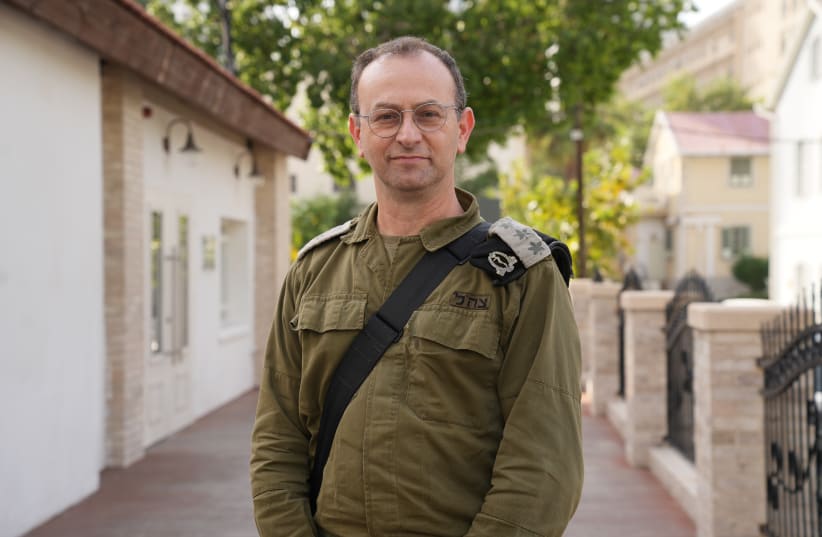It has been said that “One day can change your life; one day can ruin your life. All life is three or four big days that change everything.” This is a good description of the wartime experience of the Jewish state: the 1948 War of Independence; the 1967 Six Day War; the 1973 Yom Kippur War; and the current – and probably most earth-shaking – Israel-Hamas war that began on October 7, 2023.
There isn’t an Israeli – whether adult or young child – who has not been affected by the news of thousands of monstrous Hamas terrorists and their commanders murdering, torturing, raping, wounding, and bombing Israel during the past month. And there is no immediate end in sight.
Although Israel’s existence is not in jeopardy, the psychological pain is acute. This conflict will undoubtedly affect Israelis emotionally for decades and perhaps generations to come, placing a stamp of trauma, anger, and sadness especially on those whose family and friends have been directly affected.
“The Yom Kippur War was a picnic compared to this. It will remain in our collective psyches; but fortunately, as time passes, the effects will fade away for most,” said Col. Lucian Tatsa-Laur, an experienced psychiatrist who heads the Israel Defense Forces’ Department of Mental Health, in an exclusive interview with the Magazine.
“The human brain is built to cope. Only a minority will develop fully fledged post-traumatic stress disorder (PTSD),” he asserted.

PTSD is a mental health condition, diagnosed by a professional, whereby someone who has experienced a traumatic event is having particular types of difficulties as a result.
The main types of difficulties are:
• Re-experiencing symptoms, such as flashbacks or intrusive thoughts about the traumatic event; intense physical or emotional reactions to reminders of the event; and nightmares
• Avoidance symptoms, such as trying not to talk or think about the trauma; avoiding people, places, activities, or sensations that remind victims of the trauma
• Negative changes in their thinking and emotions, such as feeling depressed, angry, or anxious; finding it hard or impossible to feel happy, shameful, or guilty; distancing from other people; or losing interest in things they used to enjoy
• Being unable to remember important parts of the trauma; having more negative thoughts about themselves and other people
• Hyper-arousal or emotional/physical reactivity, such as being always on guard and/or easily startled; having trouble concentrating; being quick to get angry and expressing aggression; and suffering from insomnia
• Risky behaviors such as impulsive sex, and/or binge drinking
TATSA-LAUR was two years old when he came from Romania to Israel with his parents, both physicians; the family settled in Kiryat Gat. He earned his medical degree at the Hebrew University-Hadassah Medical Faculty and went on to specialize in psychiatry at the Geha Mental Health Center and the Tel Aviv University School of Psychological Sciences. His main focus was suicide prevention. After two and a half years in his current prestigious military job, he is due to retire from the IDF next year.
His department’s activities are carried out largely (80%) by mental health officers (kabanim) who are trained social workers. About 60-70% of these social workers are women, he said.
“There is no such thing as a kaban in civilian life; it is only in the military. Medical and then psychiatry students can go directly from high school to the IDF’s Atuda academic program, get their degrees, and serve in the military. But our social workers have to be mature.
“They do their army service, go on to study social work in the universities and colleges, and then return to the IDF, where they undergo lengthy, intensive, and high-level training,” said the IDF mental health chief. “They don’t sit behind desks at our three-year program for teaching mental health officers at Sheba Medical Center but go into the field to be with military personnel, so it is demanding,” he explained.
“Not that many social workers are willing to do it, even though social workers in the public sector – in municipalities and government offices – aren’t known for getting high salaries.”
In ordinary times, Tatsa-Laur has some 270 mental health officers; but since the outbreak of the war in Gaza, he has been inundated by volunteers – psychiatrists, psychologists, and social workers begging to help out, along with reserve officers who were called up. When the conflict is over, they will probably go back to their own jobs, and the number of regulars will remain about the same as before, he said.
“There’s a serious shortage of mental health professionals throughout the country, not only in the army,” he asserted. “There are not enough in private practice or even working for the health funds. The queue for public professionals is worst when families need psychiatrists, and psychiatrists for children and teens. Psychiatrists can get their specialty degree and recognition and then go out in the private sector and earn a lot, while mental health professionals in the public sector earn much less.”
Israel’s population continues to grow, and as the stigma of emotional problems and psychiatric diseases lessens, there is more demand for professional treatment. “We see this phenomenon in the IDF as well – during the pandemic and after, and now, since the outbreak of the war in Gaza,” Tatsa-Laur said.
Asked what techniques his mental health officers are using to treat acute trauma, he said each approach must be approved by experts here and abroad. “We don’t use experimental techniques that haven’t been approved. The kaban tells soldiers who are affected that being afraid is normal, that they are needed by the IDF to defend the country, and that we will help them. We can’t erase bad memories, but it’s best to go back to military service. But if this doesn’t return them to the action, we use, among other things, cognitive behavioral therapy (CBT).”

This psychological treatment has been shown to be effective for a range of problems, such as anxiety disorders, depression, alcohol and drug abuse, marital problems, eating disorders, and severe mental illness. Numerous research studies suggest that – unlike months or years of talk therapy and psychiatric medication – CBT leads to significant improvement in functioning and quality of life.
The focus of CBT is based on several core principles, including the fact that psychological problems are based, in part, on faulty or unhelpful ways of thinking, and on learned patterns of unhelpful behavior. Those suffering from psychological problems can learn better ways of coping with challenges, thereby relieving their symptoms and becoming more effective in their lives.
Patients change their thinking patterns by learning to recognize their distortions in thinking that are creating problems, and then to reevaluate them in light of reality. They also gain a better understanding of the behavior and motivation of others; can use problem-solving skills to cope with difficult situations; and learn to develop a greater sense of confidence in their own abilities. They face their fears instead of avoiding them; use role-playing to prepare for potentially problematic interactions with others; and learn to calm their mind and relax their body.
“CBT is a basket of psycho-education that includes eye movement desensitization and reprocessing (EMDR), which involves moving your eyes in a specific way while you process traumatic memories,” he noted. “EMDR’s goal is to help you heal from trauma or other distressing life experiences. We also teach the emotional freedom technique (EFT), or ‘tapping therapy,’ which is related to EMDR.”
Tapping is a mind-body therapy that draws on the traditional Chinese medicine practice of acupuncture and is used today as a self-help approach in modern psychology. It involves tapping major acupressure points on the hands, face, and upper body with one’s fingertips while focusing on uncomfortable feelings or concerns, while using positive affirmations to neutralize those feelings, relieve stress, reduce cravings, improve performance, and even help relieve PTSD symptoms.
“We also use relaxation techniques, as soldiers at war can feel guilty that they survived. We tell them that they are functioned, saved people, and did the best they could. We tell them there is an enemy; they have a mission, and they have to carry it out, even if they are exposed to trauma,” said Tatsa-Laur.
Urging people to avoid watching the horrific videos on Telegram, Facebook
HE URGES children, teens, and adults to avoid viewing the horrific videos on Telegram, Facebook, TikTok, and other social media.
“The press in Israel showed a lot of responsibility. But many already viewed these, and the effects are bad. We don’t know exactly what the long-term effects will be,” he said. “It is tragic that for most of this year, there were terrible divisions, and even hate and violence among Israelis, but now the volunteerism is incredible. We hope the unity continues also after the war.”
According to a previous IDF report, the rate of those summoned for duty and soldiers who claimed mental health issues to avoid service has increased. In 2018, it was 7.9%; by 2020 it jumped to 11.9% and is expected to reach 13% by the end of the current war. Despite this, according to the report, many Israelis with mental health problems still want to serve in the IDF.
“The system doesn’t understand those combat soldiers who came back with stories and nightmares,” Tatsa-Laur said.
He noted that “there is a relatively high percentage of haredi men who try to get out of the draft; but now, in the war, we are seeing more who want to join the army. So we are seeing two trends: those who want to evade it, and those who have the motivation to serve.”
A State Comptroller Report on the IDF’s Mental Health Department, published in April 2021, lambasted it for deficiencies. According to that report, the Mental Health Department had no criterion for deciding a soldier’s maximum waiting time for an appointment with a mental health officer. There were many soldiers who never sought help because they knew they would be on a waiting list for months. The report also stated that one in four soldiers used the army’s mental health services and met with either a psychiatrist or a mental health officer.
Commenting then on the report, an IDF spokesman said that “the waiting time today is less than four weeks; and in 92% of the cases, the average waiting time is 10 days.”
Tatsa-Laur replied that “these figures existed in 2016. Then we had corona, so the queue was much longer. We shortened it for soldiers at the front to 14 days, but it was longer – three or four months – for those who were not fighting. We are trying to do better.”
To induce more professional mental health officers to join the IDF, he said their salaries must be raised. “Today, they get no extra pay for overtime, and their hours are long,” Tatsa-Laur said. “They could be given a car to get to bases. We can send them for advanced degrees and cover their tuition. But we will never be able to compete with private services.”
